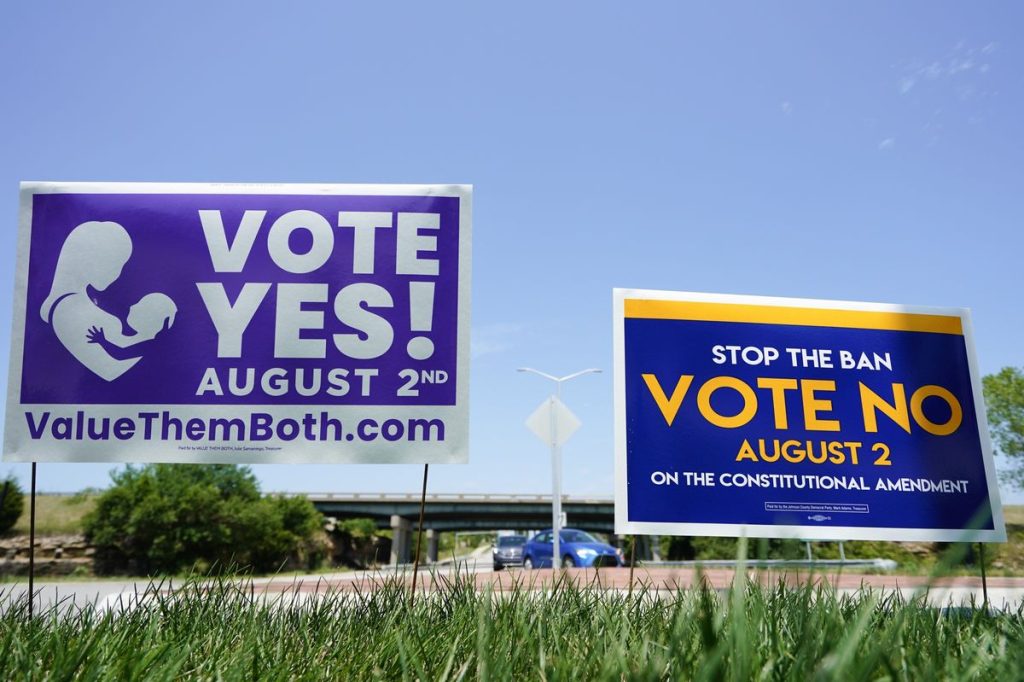Blog Post
Bleeding Kansas
By Jonathon Van Maren
So: What’s the matter with Kansas? How did an ostensibly pro-life red state vote 59% to 41% in a referendum on August 2 to reject a proposed constitutional amendment that would have explicitly stated that there is no right to abortion in Kansas?
Democrats, abortion activists, and their media colleagues, of course, are taking this as evidence that most Americans, given the choice, will vote en masse for legal abortion. Commentators from Damon Linker and Andrew Sullivan to Bill Maher and Stephen Colbert have been positively triumphant, and the new received wisdom is that an abortion backlash is coming for the GOP. This, conveniently, is the narrative these same folks were pushing before the referendum.
This result is a valuable opportunity for reflection, and a few observations are in order. First of all, I think it is necessary to point out that the ballot question was wildly confusing. It read as follows:
Because Kansans value both women and children, the constitution of the state of Kansas does not require government funding of abortion and does not create or secure a right to abortion. To the extent permitted by the constitution of the United States, the people, through their elected representatives and state senators, may pass laws regarding abortion, including, but not limited to, laws that account for circumstances of pregnancy resulting from rape or incest, or circumstnces of necessity to save the life of the mother.
That spelling mistake, by the way, was on the actual ballot. If you’re confused by the question, you aren’t the only one. Pro-lifers were to vote yes to affirm that there is no constitutional right to abortion; abortion supporters needed to vote no to signal their belief that there is a right to abortion. It isn’t just pro-lifers pointing out that the question was confusing as a result of sour grapes, either. The Guardian published an explainer prior to the vote titled “Why the language on the Kansas abortion ballot is so confusing” to walk folks through the process.
A few pro-life commentators have published measured analyses of this (admittedly) surprise result, and their takes are worth considering. Dr. Charles Camosy, author of several books on abortion, noted that this result will likely mean that Kansas becomes “a bastion of abortion extremism, including welcoming abortion tourism from other states” and that “virtually no resident wants that.” Additionally, he noted: “Didn’t Louisiana just pass a similar measure, 61 percent to 38 percent? This all seems strange? It seems less strange if one keeps in mind that our most motivated opponents across the country have been preparing (and especially fundraising) for last night since ACB was confirmed (some since Kavanaugh was confirmed).”
In short: “Money played a huge role. Once Dobbs came down, our most motivated (and well paid) opponents sprung into action, particularly when it came to planting deeply sympathetic (if misleading and even false) stories about women whose lives would be put at risk protecting prenatal injustice. It was impressive. Perhaps never really believing that Roe/Casey would fall, coupled with groupthink created by the social media algorithms, some pro-lifers had a false sense of security, especially in so-called red states. But it is more than just losing out to money and a better ground game. It is the fact that abortion bans in the early trimester are just not that popular. On the other hand, over 70% of Americans want abortion banned, with exceptions, after 12 weeks.”
Pro-lifers need to respond to one thing above all: “We need to make our model legislation absolutely clear…absolutely one million percent clear…that physicians can do whatever is necessary to save the mother’s life. Yes, even if that language is added there will continue to be dishonest players claiming they ‘just aren’t’ sure’ and ‘maybe they still feel like women need to die because of pro-life laws.’ But those extremists don’t decide elections.”
Dr. Michael New, the pro-life movement’s resident statistician and political scientist, also had important feedback. He concurred with Camosy that money was an issue—“since abortion is a multi-billion dollar industry subsidized by taxpayers, our opponents can almost always outspend us.” But additionally, New noted, there are historically two conditions at play when pro-lifers prevail in referendums: “1) The campaign must take place in a red state 2) The pro-life policy change must be incremental and difficult to caricature or demonize. Tonight the first condition held, but the second one did not. The implications of ‘Value them Both’ were unclear and that made it easier for our opponents to distort the measure.”
“It is also important to note that the mainstream media coverage of abortion post-Dobbs has become more biased and more partisan than ever. That did not help,” New stated. “If the Kansas State Supreme Court mandates the KS Medicaid program start funding elective abortions or strikes down a gestational age limit — I would return with a narrower ballot proposition to reverse that decision. That would be much easier for pro-lifers to win.” Pro-lifers also need to remember that the negative media coverage—including cherry-picked or distorted stories of difficult abortion scenarios—are only going to increase in the years ahead. This is the tried and true tactic of the abortion movement, and it is literally how they legalized abortion in Ireland (I wrote several chapters of a book on that subject).
Finally, Alexandra DeSanctis—who covers the pro-life beat for National Review and recently co-authored a book on the subject with Ryan T. Anderson—penned a short piece titled “Kansas Is Not a Bellwether on Abortion.” DeSanctis observed that abortion activists had successfully characterized the ballot question as a vote on whether or not to ban abortion across the board rather than a return to abortion neutrality. “In short,” she wrote, “supporters of abortion effectively won the messaging battle. While many Kansans likely opposed the state supreme court ruling finding a right to abortion in the constitution and would prefer more pro-life laws than are currently permitted, they also didn’t like the idea of a total abortion ban, which is how the other side managed to cast the amendment.”
DeSanctis had two words of caution for pro-lifers: “Don’t allow Republican politicians to consider the outcome in Kansas evidence that being pro-life is electorally toxic. One bad result on a confusing amendment in a state that’s relatively moderate on abortion isn’t indicative of how Americans feel about abortion policy. And the second: Remember that the Democratic Party is deeply out of step with Americans, and its own voters, on abortion.” In short, this is a battle of messaging. It is also a battle that pro-lifers can win if they learn lessons from election losses. But Kansas should also remind pro-lifers that post-Dobbs, all the work is ahead of us.
Abortion activists have a multi-billion-dollar tax-funded industry, corporate leaders, celebrities, the entire Democratic Party and, most importantly, the mainstream media, which constantly pumps out stories specifically designed to impact public opinion. Pro-lifers are going to have to work extraordinarily hard to combat the media narrative, which will drive voters to the polls in referendums like that in Kansas. In Ireland in 2018, a population substantially more pro-life than that of most American states voted to repeal protections for pre-born children because they were persuaded that this was necessary to ensure that women didn’t die. We should learn from that strategy, because we are seeing it repeated in the United States.









There’s more to it than that. Kathleen Sebelius was the most pro-abortion member of Obama’s cabinet, was she not? She was the governor of Kansas immediately before accepting the role of Secretary of Health for Obama. Kansas has been purple for a long time, the entire midwest is politically purple. The rural parts of the states suffer from brain drain, and its not just the super-genius going off to the land grant colleges, everyone who isn’t a burnout leaves for the university in the big city and gets indoctrinated. If they return home, they get a job working for the government or the gas station, and they tow the line. They live off the property taxes levied against the remaining farmers who might have a giant pro-life or Trump sign up on the side of their property. The rural public school administration personnel are among the most influential in small towns now, because they have better incomes relative to the gas station workers and they have more availability to attend meetings than the farmers, whose tax burden they live off of.
Great observation.
Kansas is a red state by any definition. Republicans won its electoral votes in just about every presidential election since the beginning of the modern two-party system, usually by landslide margins. That being said, red states aren’t all the same. Kansas was proud George Tiller country for many years – they threw out attorney general Phill Kline because he investigated the abortion industry too aggressively for their liking (he no longer cares about pro-life issues, now constantly tweeting only about stolen election conspiracy theories). And of course, Governor Sebelius won election twice. Sadly, it looks like they’ll continue down this path at least for the near future.
A lot went wrong. Ultimately, I think everyone overestimated how pro-life George Tiller country was. That’s the only way to explain a 20-point margin. The pro-life side was outspent, but only by a bit and we’ve won despite being outspent by bigger margins before. Some of it was unforced errors. The wording was confusing (as noted abortion advocates were whining about it back when they thought they were going to lose), and more straightforward amendments passed easily in Louisiana, Alabama, West Virginia, and Tennessee. It’s true that the media has been more biased, hysterical, and dishonest than ever before (check out how they’re covering the story of a Nebraska woman ordering abortion pills for her 23-week pregnant daughter and burning the corpse because she wanted to fit into her jeans). That’s going to continue, and there’s not much we can do about that, though fortunately more and more people have lost trust in the news media. But with ectopic pregnancies, the issue is not that the laws are unclear. If they were, abortion clinics would go to court to get them struck down for vagueness. But they’re largely not doing that, because they know they’d lose. Rather, pro-abortion doctors and hospital attorneys are deliberately letting women suffer harm to sabotage pro-life laws by falsely claiming that their hands are tied. If Savita Halappanavar had been given the care she was entitled to under Irish law instead of the “Catholic country” speech, the 8th Amendment would still be in place and the Irish abortion movement would be a bunch of Internet trolls at Broadsheet.ie. Abortion advocates know this, which is why they’ve graduated from killing babies to killing women. Pro-life lawyers, particularly state attorneys general, need to go on the offence. Call them out and help women sue the doctors and hospitals responsible. Those that commit malpractice are a clear danger to the public and must have their licences shredded. Meanwhile it’s critical that pregnant women seek care from AAPLOG members that will look out for them and their children.
If nothing else, this should serve as a reminder to pro-life advocates that they need to show up for the midterm elections. While Republicans are favoured to win at least the House, it’s by no means a done deal. Everyone thought Republicans would win the 2021 Georgia senate runoffs, but Donald Trump’s “Stop the Steal” nonsense allowed Democrats to pull a rabbit out of a hat and narrowly win control of the chamber. Should Democrats win back control of the house (a 21% chance according to 538) and net two more far-left senators (which I think is more likely than not looking at how bad the candidates are in Ohio, Pennsylvania, and Georgia) they will nuke the filibuster to reinstate abortion on demand in all 50 states. The bill that passed the house and got 48 votes in the Senate (as well as the endorsements of the president and vice-president) would eliminate even modest limits like parental notification, safety inspections, bans on sex-selective abortion, and informed consent. The only thing it would leave in place is the partial-birth abortion ban (the abortion lobby lost that debate so badly that they don’t dare reopen it). Repeal of the Hyde Amendment is a given. Democrats may go even further by packing the Supreme Court (less likely after Dobbs; I think it was meant to be more of a deterrent than ), making DC a state (permanently adding two 100% pro-abortion senators), and reforming elections to make it much harder for Republicans to win.